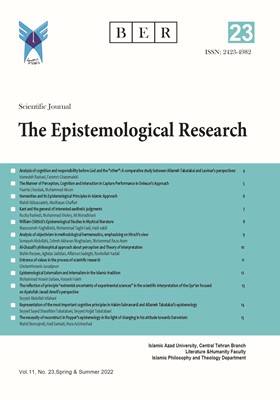An Analysis of objectivism in methodological hermeneutics, emphasizing on Hirsch's view
Subject Areas : Epistemological researchessomayeh abdollahi 1 * , zohreh akhavan moghadam 2 , Mohamad Reza Aram 3
1 - Ph.D candidate of Quran and Hadith sciences department, North Tehran Branch, Tehran Iran
2 - Associate professor and faculty member of the Holy Quran University of Science and Knowledge
3 - Associate Professor of Quran and Hadith Sciences department, central Tehran Branch, Islamic Azad university, Tehran. Iran
Keywords: understanding, objectivism, relativism, Eric Hirsch, methodological Hermeneutics,
Abstract :
Hermeneutics has been defined as "interpreting". Hermeneutics has faced many differences and conflicts in its tumultuous history, and the views of theorists on the mission of hermeneutics and its realm have varied widely. One of the most controversial issues in hermeneutics, which has even led to a fundamental shift in hermeneutic issues, was the ontological view of understanding, as regarded by Heidegger and Gadamer. They did not know the truth, as in previous periods, through the presentation of methods can be achieved. Philosophical hermeneutics believed in subjectivism; Prior to the emergence of this view, hermeneutics such as Schleiermacher and Delta sought to find a way to understand and to understand the correctly in terms of author and objectivity will be possible. Although ontological approach to the understanding of discourse are considered by many of twenty century philosophers, It also has been faced the criticism. Emilio Betty Warrick Hirsch defended objectivism in understanding texts with a critical and methodological view of understanding. This methodological approach is called methodological hermeneutics and the ontological approach is called philosophical hermeneutics. In this article, we try to explain the objectivist methodological hermeneutics through a library method and, referring to Heidegger and Gadamer's views, address the most important critiques of Hirsch in the subjective approach of philosophical hermeneutics.
احمدی، بابک (1372)، ساختار و تاویل متن، تهران، نشر مرکز.
فنایی اشکوری، محمد (1374)، معرفتشناسی دینی، تهران، برگ.
پالمر، ریچارد (1377)، علم هرمنوتیک، ترجمه: محمد سعید حنایی کاشانی، تهران، نشر هرمس.
پورحسن، قاسم (1392)، هرمنوتیک تطبیقی: بررسی همانندی فلسفه تأویل در اسلام و غرب، تهران، بنیاد حکمت اسلامی صدرا.
جوادی آملی، عبدالله (1372)، شریعت در آینهی معرفت، مرکز نشر فرهنگی رجا، کتاب نقد، پلورالیزم و تکثرگرایی، شماره 4.
خسروپناه، عبدالحسین (1393)، مسائل جدید کلامی و فلسفه دین، قم، نشر بینالمللی المصطفی.
بلخر، ژوزف (1393)، آشنایی با مبانی هرمنوتیکی امیلیو بتی، ترجمه محمدحسین مختاری، قم، عروه الوثقی.
فروند، ژولین (1388)، آراء و نظریههای در علوم انسانی، ترجمه علیمحمد کاردان، تهران، نشردانشگاهی.
گادامر، هانس گئورگ (1382)، آغاز فلسفه، ترجمه: عزت الله فولادوند، تهران، هرمس.
گورنر، اشتفان (1367)، فلسفه کانت، ترجمه: عزت الله فولادوند، تهران، خوارزمی.
مصباح، مجتبی (1386)، فلسفه اخلاق، تهران، موسسه آموزشی و پژوهشی امامخمینی ره، چاپ چهاردهم.
مک کواری، جان (1376)، مارتین هایدگر، ترجمه: محمد سعید حنائی کاشانی، تهران، نشر گروس.
نصری، عبدالله (1381)، راز متن (هرمنوتیک، قرائتپذیری متن و منطق فهم دین)، تهران، نشر آفتاب توسعه.
نیچه، فریدریش ویلهلم هایدیگر، مارتین ریکور، پل اکو و جمعی از نویسندگان (1377)، هرمنوتیک مدرن (گزینه جستارها)، مترجمان: احمدی، بابک؛ مهاجر، مهران و نبوی، محمد، تهران، مرکز.
واعظی، احمد (1393)، درآمدی بر هرمنوتیک، تهران، پژوهشگاه فرهنگ و اندیشه اسلامی، چاپ هفتم.
وال ژان، ورنو روژه (1372)، پدیدارشناسی و فلسفههای هست بودن، ترجمـه یحیـی مهـدوی، تهران، خوارزمی.
هادوی تهرانی، مهدی (1377)، مبانی کلامی اجتهاد در برداشت از قرآنکریم، قم، نشرخانه خرد.
هیرش، اریک دونالد (1395)، اعتبار در تفسیر، ترجمه محمدحسین مختاری، تهران، نشر حکمت.
هوی، دیویدکوزند (1385)، حلقه انتقادی، ترجمه مراد فرهادپور، تهران، روشنگران و مطالعات زنان، چاپ سوم.
Dilthey, Wilhelm, (2002), The Formation of the Historical world in the Human Sciences, trans. Rudolf A. Makkreel and Frithjof Rodi. Princeton University Press.
Gadamer, Hans-Georg, (1994), Truth and method, continuum new York.
Heidegger, Martin, (1962), Being and Time, Basil Black Well.
Hirsch, Eric, (1976(, The aims of interpretation, the university of Chicago press.
Paul Ricoeur, (1973), The Task of Hermeneutics, Philosophy Today, 17(2):112, 128.
Richard J. Bernstein (1984), Beyond Objectivism and Relativism, University of Pennsylvania Press 1984.
_||_

